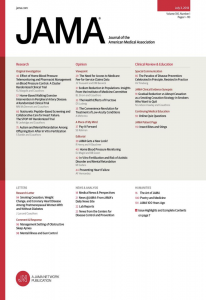ACTS Trial in JAMA
 Investigators from the department of emergency medicine contributed to a groundbreaking article published in the Journal of the American Medical Association this month.
Investigators from the department of emergency medicine contributed to a groundbreaking article published in the Journal of the American Medical Association this month.
“The Effect of Ascorbic Acid, Corticosteroids, and Thiamine on Organ Injury in Septic Shock: The ACTS Randomized Clinical Trial” evaluated the effects of nutritional supplementation and steroids in the treatment of sepsis, a life-threatening complication of serious infections.
Co-author Dr. Pratik Doshi and participating ACTS investigators (Ryan Huebinger, MD, Richard Gordon, MD, Ben Karfunkle, MD, Elizabeth Jones, MD) helped enroll patients at the The University of Texas Health Science Center which was among the largest study sites.
The study helps physicians understand more about the treatments that do and don’t work for sepsis – a condition that affects 1.7 million Americans every year and is responsible for nearly 270,000 deaths (CDC).
In this RCT, a combination of hydrocortisone, ascorbic acid, and thiamine (the HAT or Marik protocol) did not statistically significantly reduce SOFA score or mortality within 72 hours of enrollment among patients with septic shock https://t.co/cuB6X4fJhi
— JAMA (@JAMA_current) August 18, 2020